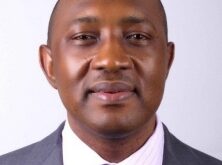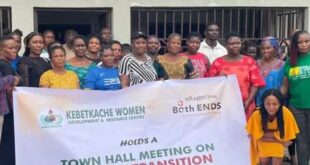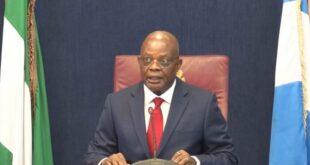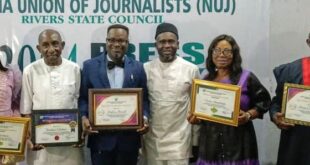By Kelechi Nwaucha
In 2016, Nigeria signed the United Nations Framework Convention on Climate Change (UNFCCC) Paris Agreement, which it ratified in March 2017, and thus committed to an unconditional reduction of its greenhouse gas (GHG) emission by 20 percent, as well as a conditional reduction of 45%, by 2030.
Part of Nigeria’s climate targets, as expressed in its 2021 Update, is to achieve net-zero emissions by 2060.
Six years to the 2030 target year, information and shared knowledge on the nation’s international agreements and commitments on climate change “have remained largely a federal-level preserve, yet to percolate to the sub-national, local council and community levels.”
Last Friday in Port Harcourt, non-governmental organization, Kebetkache Women Development and Resource Center, with support from Both ENDS and Global Alliance for Green and Gender Action (GAGGA), organized an Interactive Session, with the National Council for Climate Change, for civil society groups, state and local government officials, members of the clergy, community persons and the media from Rivers, Bayelsa and Akwa Ibom states.
According to executive director of Kebetkache Women Development and Resource Center, Dr. Emem Okon, the aim of the 3-day workshop was to build the capacity of these groups on issues of Climate Change mitigation, adaptation and Nigeria’s commitment to global efforts to achieve net-zero emission.
She said, “The climate crisis is a global issue. In the Niger Delta and in Rivers State in particular, we are experiencing climate change manifestations. So it is very important to find out what is going on at the national level on responses to climate change and also what is going on at the global level.”
Dr Okon noted that “Every year the United Nations holds the Conference of Parties, the United Nations Framework Convention on Climate Change. The last of such conference was held last year, December, in Dubai. Nigeria went with a large delegation.
“There is need for us here and at the local level to find out what are they talking about, what are they saying, what are they planning,” she said.
Dr Okon further said, “We have before now brought civil society experts to train community leaders and government, particularly local government, on climate change and the Green Climate Fund.
“But there are different policies or strategies at the federal level, the Adaptation and Mitigation Strategy, the National Climate Change Act, and a lot of other frameworks at the federal level that people at the state and local level are not aware of.
“We took the step to reach out to the Department of Climate Change and the National Council on Climate Change,” she said, adding that “the interaction resulted in them accepting to come to Port Harcourt to talk to us.
“It’s like hearing from the horse’s mouth, telling us what they are doing, how they are engaging at the international level and also making us to understand our roles and how we can also work with them to ensure that the climate crisis we are experiencing in our communities can be addressed,” she said.
Representative of the National Council on Climate Change at the event, Amudi Chioma Felistas Edeh, who is also the Desk officer for the Nationally Determined Contribution (NDC) and the Long-Time Low Emission Development Strategies (LT-LEDS), both instruments and elements of the Paris Agreement, noted that “basically, taking climate action is a win-win thing.”
Delivering papers on Nigeria’s NDCs, commitment to Paris Agreement, 2021 NDC Update, Climate Change Act, Energy Transition Plan, 2060 Net-Zero Emission target among others, Amudi said that the beauty of taking climate action “is that it has core benefits.
“So whatever activities you want to do on issues of climate change that has emission reduction potential, make sure that it’s addressing the core needs of the targeted communities,” she urged participants.
Amudi noted that capacity building events are important to the work they do at the National Council for Climate Change, adding that “what we do is to formulate policies, create an enabling environment for key stakeholders to take action.
“And we have been in this forum with CSOs and government officials, the media, the religious group and also the local government. These are the relevant stakeholders that will be responsible for the implementation of the LT-LEDS and also the NDC.
“My overall call to Nigerians is that sustainable development has a lot of co-benefits. And it’s also a means for the future. There is nothing that you would do today that doesn’t have climate components in it.
“So make sure that we integrate on mainstream issues of climate change in all the agenda of the government, from the federal to the state and the sub-national government, the state and also the community,” she said.
Bernadette Ejiofor, also from the National Council on Climate Change, who presented a paper on an Overview of the Green Climate Fund (GCF) and modalities for Accessing it, noted that Nigerians are not doing well in terms of accessing global climate funds.
She urged participants to develop projects that are bankable and meet the requirements of such global climate funds. “So we need to come up with projects that suit all those funds, be able to assess it, whether for waste disposal, power generation, whatever kind of projects you have.”
Ejiofor however added that ” We on our own part have to be accountable too. When these funds are given to us, they should be channeled to the purpose for which the fund was given.”
Permanent secretary, Rivers State Ministry of Women Affairs, Mrs Uche Uriri, “Women are the center of every activity because they are more vulnerable and they are more negatively impacted in case of any adverse climate change. So it becomes imperative to mainstream gender into every activity involving climate change.”
She described the initiative as a plus for women in the state and would ensure they, “right from grassroots are carried along.
“You know, it will no longer end at the national level. It will be stepped down to even the local government level and village level, where most women reside. And most women are agriculturists. So affected by adverse climate change. So it’s going to be very beneficial to Rivers women,” she said.
Chief Constance Meju, co-publisher of National Point Newspaper and coordinator of the Center for Media, Environment and Development Communications, said that among issues of flooding and waste, one of the greatest problems facing the Niger Delta is land degradation.
“It is land degradation that has pushed our youth out of the traditional livelihood source, that is making them look lazy and forcing them even to go and start looking for oil to steal.
“But because the environment is our own, my appeal to the youth is take it easy. Let us not completely destroy ourselves because we have no other place.”
 PH Mundial – Port Harcourt Online Newspaper News Across The Region
PH Mundial – Port Harcourt Online Newspaper News Across The Region





